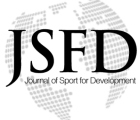
Recently, there have been calls to understand better the relationship between sport and climate change, and to communicate the severity of the climate crisis to as wide an audience as possible. However, given the current climate crisis, we argue that the challenge facing the Sport for Development and Peace (SDP) sector is not to know more about climate change and the place of sport therein, but to imagine a better future and what to do to get there. In this paper, we discuss some specific ideas and approaches that SDP stakeholders might take in doing so. Specifically, we argue for moving beyond the idea of SDP as a tool for responding to or promoting environmental sustainability, as articulated in some policies and frameworks including the Sustainable Development Goals, and to move instead towards a reconceptualization of SDP as itself an ecological endeavor. In so doing, we draw on contemporary ecological notions like the New Climatic Regime and Buen Vivir, that can help to position sport and SDP not as a solution to the climate crisis, but as a fundamental aspect of ecological life on Earth in the years ahead.